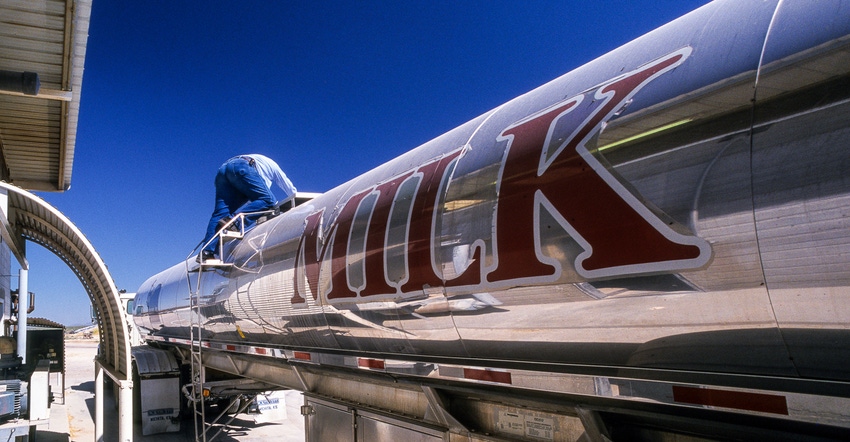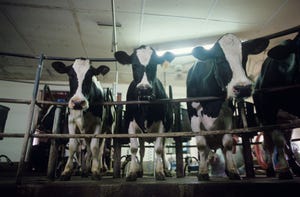Actions taken to prevent, ease impact of milk dumping
Dairy cooperatives working to move additional milk surplus to avoid the need for dairy farmers to dump milk.

COVID-19 shutdowns have caused disruption in the milk market, and dairy producers are dumping milk as a result. The government is taking actions to ensure milk producers aren’t wrongly penalized, and dairy cooperatives are taking actions to ensure the milk gets to those who need it, instead of dumped.
USDA’s Risk Management Agency (RMA) is ensuring that milk producers are not inappropriately penalized if their milk must be dumped because of recent market disruptions caused by the coronavirus pandemic. In addition, RMA is extending inspection deadlines, waiving inspection requirements and authorizing more crop insurance transactions over the phone and electronically to help producers during the crisis.
Many state and local governments have issued “stay-at-home” orders and have shut down non-essential businesses in response to the COVID-19 pandemic, resulting in market disruptions and preventing in-person crop insurance transactions.
Specifically, RMA is:
Allowing dumped milk to be counted as milk marketings for the Dairy Revenue Production (DRP) or actual marketings for the Livestock Gross Margin for Dairy (LGM-Dairy) programs;
Allowing phone and electronic transactions for 2021 crop year sales and reporting dates, including options and endorsements;
Extending the deadline for some perennial crop Pre-Acceptance Inspection Reports (PAIRs);
Waiving the 2021 crop year inspection requirements for the Nursery and Nursery Value Select (NVS) programs in certain cases.
“Dairy Revenue Protection is a vital risk management tool for our dairy farmers, especially during times like these, and USDA wants to ensure producers continue to get the coverage they purchased. RMA is making some further adjustments to assist the crop insurance industry and America’s farmers and ranchers,” RMA Administrator Martin Barbre said. “We will continue to make adjustments as needed to ensure that the Federal crop insurance program continues to serve the risk management needs of our nation’s producers during this unprecedented time.”
For the 2020 calendar year, RMA is allowing Approved Insurance Providers (AIPs) to count dumped milk toward the milk marketings for the DRP or actual marketings for the LGM-Dairy programs regardless of whether the milk was sold. Producers will still have to provide to the AIPs supporting documentation from the cooperative or milk handler verifying the actual pounds dumped and that the milk was dumped.
The National Milk Producers Federation thanked the U.S. Department of Agriculture for allowing discarded milk to be counted toward milk marketings for the Dairy Revenue Production (DRP) or as actual marketings for the Livestock Gross Margin for Dairy (LGM-Dairy) programs. That decision will allow dairy farmers participating in those risk management programs not to lose coverage on any milk that can’t be marketed and will be helpful in mitigating some of the catastrophic damage many dairies face due to supply-chain disruption caused by the coronavirus crisis.
“The market realities of the COVID-19 era demand solutions, and USDA’s decision is a balm for thousands of dairy farmers participating in these important risk-management programs,” NMPF President and CEO Jim Mulhern. “We commend USDA’s decision and look forward to discussing further actions that can provide immediate relief for all dairy farmers, as outlined in our joint plan developed with the International Dairy Foods Association. Together, we can make a real difference for dairy, and we are pleased with USDA’s action here.”
Milk donation efforts increase
The Dairy Farmers of American Mideast Area team has been working to prevent its area farmers from needing to dump milk. While many processors have cut orders because they are running out of storage space or don’t want to build inventory for which they have no sales, DFA has asked if they would be willing to take donated milk that may have otherwise been dumped and donate the processing and packaging so milk and dairy products can be delivered to food banks.
“Milk that is disposed of has no value but it can be extremely valuable to the hungry people who need it most. While our goal is always to market your milk to the best advantage possible, in times like these, we are willing to go to extraordinary lengths to find a home for the milk you work so hard to produce,” DFA said in a notice to its farmers.
Since last June, DFA said it partnered with Kroger Tamarack in Newark, Ohio, to donate milk to the Mid-Ohio Food Bank in central Ohio. “We have been donating four pallets of 2% half-gallons each week and are immediately increasing that donation by 25% to meet the food bank’s current demand. We have also reached out to other food banks in Kroger’s delivery area to gauge needs and get more milk to those food banks,” DFA said.
Daisy Brands in Wooster, Ohio, has committed to donate processing for more than 80,000 24-ounce containers of cottage cheese for delivery to local food banks. DFA is working with the United Dairy Industry of Michigan and Spartan Nash convenience stores to donate gallons of milk and 24-ounce containers of cottage cheese. This effort will make more than 64,000 units of milk or cottage cheese available to Michigan food banks. DFA said it is also working with the other Dean Foods plants in the area to identify what processing capacity they have and match it with local food banks that need the milk.
Terry Rowlett, DFA corporate board member, has been buying back milk to produce cheese at Rowlett’s Milkhouse Creamery. DFA is donating milk back so he can produce cheese for his local food bank. “We are also working with several other cheese processors to encourage them to take milk and donate some or all of the processing cost in order to make cheese available to food banks at little or no cost,” DFA said.
About the Author(s)
You May Also Like





